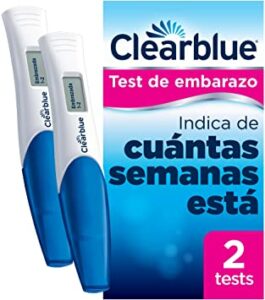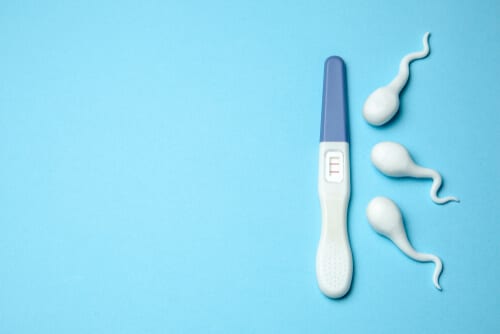Pregnancy test results
A pregnancy test can return a positive or negative result. If the amount of the HCG hormone is less than 5 mIU/ml, you are not pregnant. If the amount of the HCG hormone is equal to 5 mIU/ml or higher, there is pregnancy. You will be able to see in this post everything about the tests and their sensitivity.
In the case of presenting positive, the result (depending on the test) can show the weeks of gestation you have based on the concentration of the aforementioned hormone.
False negatives and false positives
We are referring to when the test is negative and finally it is positive, something relatively common; or a positive test result that later does not lead to pregnancy, something much more occasional.
Recommendations to avoid errors in detecting pregnancy with home tests
To avoid false negatives and for the result to be reliable, it is advisable to follow a series of recommendations:
- Thoroughly follow the recommendations of the manufacturer of the chosen test, both regarding its operation and the days on which the test should be performed. Not all products work exactly the same and, with nerves, instructions and recommendations may not be interpreted well enough. And if it is advisable to wait for a certain time in the cycle to perform the test, it is good to try to respect these times.
- In the case of women with irregular cycles, the calculations become more complicated, as they may have become pregnant several days after what was initially calculated and may be more likely to obtain an erroneous result if the test is performed with very tight deadlines. In any case, in these cases the tests must be repeated after a few days to confirm the result.
- It is recommended to perform the test first thing in the morning. As soon as we get up, our urine has higher concentrations of HCG, so there is less chance of false negatives. During the rest of the day you can also perform the test, but, especially if we drink a lot of water, the hormone concentrations drop and the test may not be sensitive enough and may not detect the hormone.
- You should be aware that some fertility medications or other medications containing HCG may interfere with pregnancy test results. However, most medications, including antibiotics and birth control pills, do not affect the accuracy of home pregnancy tests.
- Last but not least, it is advisable to check the expiration date of the test.
In any case, when in doubt, the safest way to confirm pregnancy will always be through an analysis of the HCG hormone in the blood.
Could a positive result be incorrect?
Although it is rare, since a 97% probability of success is calculated (if the test has been performed correctly), it is possible to obtain a positive result from a pregnancy test and ultimately not confirm the pregnancy. This is known as a false positive.
A false positive can occur in case of pregnancy loss shortly after the fertilized egg attached to the endometrium. It would be what is known as a biochemical pregnancy.
Another case of false positive can occur in anembryonic pregnancies or anembryonic (without an embryo), that is, when an egg is fertilized but after implanting in the endometrium, only the gestational sac ends up forming, without the embryo developing inside.
A false positive result may also be obtained in women with hormonal disorders or due to contamination with residual artificial HGC hormones from fertility medications. This usually happens if the test is done too early and the body has not yet been able to eliminate said hormone.
Some rare diseases, such as trophoblastic diseases and some cancers (gonadotropin-secreting tumors), may also produce a high amount of chorionic gonadotropin hormone, giving a false positive test result.
And another possibility would be in the case of ectopic embryos, that is, those that occur outside the uterus or womb, where the chances of it coming to fruition are very low but HCG levels do rise.
Could a negative result be incorrect?
It is possible to get a negative pregnancy test result when you are actually pregnant. This is known as a false negative.
The main reason for a false negative result is performing the test too early in the gestational cycle. In case of a negative result, it should be done again a week later, or resort to a blood test, which can detect HGC levels from days 7 or 9 after conception.
Anyway, a secret: sometimes it's just a matter of waiting just a few more minutes!
Rushing can make the minutes needed for the test to react seem eternal. It's not crazy to consider using a stopwatch to wait for the right amount of time.
So… a little patience and a lot of luck!
Here I leave you two of the best-selling sensitive pregnancy tests to avoid any error in the result

It may interest you:


